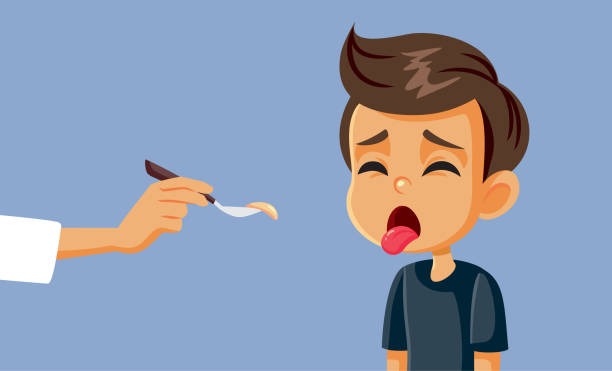Unusual taste, or dysgeusia, is a common condition that affects many people. It is the medical term for an altered taste in the mouth. People with this condition describe all foods as tasting bitter, sour, sweet, or metallic. Unusual taste can be caused by many different factors, such as infections, medications, dental problems, or vitamin deficiencies. The underlying reason for the unusual taste has to be addressed during treatment.
In this blog post, we’ll explain what unusual taste is, what causes it, what symptoms it may have, and what treatment options are available. We’ll also share some tips and resources to help you prevent and manage unusual taste and the conditions that cause it.
What is unusual taste?
Unusual taste is a term that describes the feeling of having a different or unpleasant taste in your mouth, even when you’re not eating anything. It can affect your sense of taste, which is one of your basic senses that helps you evaluate food and drinks.
Your sense of taste is caused by chemical compounds in food and drinks that interact with sensory cells in your taste buds. These cells send signals to your brain, which helps you identify the taste. Humans can recognize five types of tastes: sweet, sour, salty, bitter, and savory.
Unusual taste can distort or change any of these types of tastes. For example, you may find that foods that used to taste good now taste bad or rotten. You may also find that foods that are characteristically sweet or salty no longer taste sweet or salty. You may also have a constant taste in your mouth that is metallic or bitter.
What causes unusual taste?
There are many different factors that can cause unusual taste, including:
• Infections: Infections are one of the most common causes of unusual taste. Infections can affect your gums, mouth, throat, nose, or sinuses. They can cause inflammation and swelling that reduce blood flow to your taste buds and alter your sense of taste. They can also produce mucus or pus that affect your sense of smell and taste. Some examples of infections that can cause unusual taste are:
• Gum disease: Gum disease is an infection of the tissues that support the teeth. It can cause bleeding, pain, bad breath, and tooth loss. It can also affect your sense of taste by causing inflammation and infection in your mouth.
• Sinusitis: Sinusitis is an infection of the air-filled spaces behind your nose, cheeks, and forehead. It can cause headaches, fever, nasal congestion, and facial pain. It can also affect your sense of taste by producing mucus that blocks your nasal passages and interferes with your smell and taste.
• COVID-19: COVID-19 is a novel coronavirus-based respiratory illness. It can cause fever, cough, shortness of breath, and loss of smell and taste. It can also affect your sense of taste by damaging the nerve cells that transmit signals from your taste buds to your brain.
• Medications and treatments: Medications and treatments are another possible cause of unusual taste. Many medications and treatments can cause unusual taste as a side effect, either directly by affecting the nerve cells that regulate taste, or indirectly by causing dry mouth, nausea, or vomiting that interfere with taste. Some examples of medications and treatments that can cause unusual taste are:
• Antibiotics: Antibiotics are prescription drugs used to treat bacterial infections. They function by destroying or inhibiting bacterial growth in your body. However, antibiotics can also affect your sense of taste by altering the balance of bacteria in your mouth or by causing metallic bitter, or sour tastes in your mouth.
• Chemotherapy: Chemotherapy is a treatment used to kill cancer cells in your body. It works by using drugs that target rapidly dividing cells such as cancer cells but also affect normal cells such as those in your mouth tongue and throat. Chemotherapy can affect your sense of taste by damaging inflaming or infecting these cells or by causing dry mouth nausea or vomiting.
• Zinc supplements: Zinc supplements are used to treat or prevent zinc deficiency which can cause impaired immune function poor wound healing and loss of appetite. Zinc supplements can affect your sense of taste by altering the activity of zinc-dependent enzymes in your mouth or by causing metallic bitter or sour tastes in your mouth.
• Dental problems: Dental problems are another potential cause of unusual taste. Dental problems can affect your oral hygiene your saliva production and your dental health. They can also affect your sense of taste by causing infection inflammation or damage in your mouth teeth or gums. Some examples of dental problems that can cause unusual taste are:
• Tooth decay: Tooth decay is the breakdown of tooth enamel due to bacteria acid and plaque. Tooth decay can cause cavities pain sensitivity and bad breath. It can also affect your sense of taste by causing infection or inflammation in your mouth.
• Gum disease: Gum disease is an infection of the tissues that hold your teeth in place. It can cause bleeding pain bad breath and tooth loss. It can also affect your sense of taste by causing inflammation and infection in your mouth.
• Dentures: Dentures are artificial teeth that replace missing teeth. They help you chew speak and smile normally. However, dentures can also affect your sense of taste by interfering with the contact between food and your tongue or by causing irritation or infection in your mouth.
• Vitamin deficiencies: Vitamin deficiencies are another possible cause of unusual taste. Vitamin deficiencies can affect your overall health your immune system and your nerve function. They can also affect your sense of taste by impairing the development or function of your sensory cells in your tongue or brain. Some examples of vitamin deficiencies that can cause unusual taste are:
• Vitamin B12 deficiency: Vitamin B12 deficiency is a condition that occurs when you don’t get enough vitamin B12 from food or supplements. Vitamin B12 is essential for making red blood cells DNA and nerve cells. Vitamin B12 deficiency can cause anemia fatigue weakness numbness tingling memory loss depression and dementia. It can also affect your sense of taste by damaging the nerve cells that transmit signals from your tongue to your brain.
• Folate deficiency: Folate deficiency is a condition that occurs when you don’t get enough folate from food or supplements. Folate is essential for making DNA red blood cells and nerve cells. Folate deficiency can cause anemia fatigue weakness numbness tingling depression birth defects and neural tube defects. It can also affect your sense of taste by impairing the development or function of sensory cells in your tongue or brain.
• Zinc deficiency: Zinc deficiency is a condition that occurs when you don’t get enough zinc from food or supplements. Zinc is essential for immune function wound healing growth development cell division enzyme activity hormone production and nerve function.
Zinc deficiency can cause impaired immune function poor wound healing loss of appetite growth retardation hair loss skin problems diarrhea impotence infertility night blindness poor vision poor smell poor hearing poor memory poor concentration depression irritability mood swings aggression learning difficulties behavioral problems mental retardation seizures coma death… (you get the idea) …It can also affect your sense of taste by altering the activity of zinc-dependent enzymes in your mouth or brain.
What are the symptoms of unusual taste?
The symptoms of unusual taste depend on its cause severity and duration. Some common symptoms of unusual taste are:
• A feeling of having a different or unpleasant taste in your mouth, even when you’re not eating anything
• A change in your perception of the taste of foods and drinks, such as finding them too sweet, sour, salty, bitter, or metallic
• A loss of interest or enjoyment in eating or drinking
• A loss of appetite or weight
• A difficulty chewing, swallowing, or speaking
• A dry mouth or increased thirst
• A bad breath or a bad smell in your nose
• A headache, nausea, vomiting, or diarrhea
What are the treatment options for unusual taste?
The treatment options for unusual taste depend on its cause, severity, and impact on your daily life. Some common treatment options for unusual taste are:
• Self-care: Self-care measures can help relieve mild to moderate unusual taste caused by temporary factors such as infections, medications, dental problems, or vitamin deficiencies. Some self-care measures include:
• Practicing good oral hygiene by brushing your teeth twice a day, flossing daily, using mouthwash, and cleaning your tongue
• Drinking plenty of water to stay hydrated and rinse your mouth
• Chewing sugar-free gum or candy to stimulate saliva production and freshen your breath
• Eating foods that are cold, soft, bland, or moist to reduce irritation and enhance taste
• Avoiding foods that are hot, spicy, acidic, bitter, or metallic to prevent worsening taste
• Adding herbs, spices, sauces, or condiments to foods to improve flavor and variety
• Using plastic utensils instead of metal ones to avoid metallic taste
• Quitting smoking or avoiding tobacco products to improve taste and smell
• Taking vitamin supplements as recommended by your doctor to correct any deficiencies
• Medical care: Medical care may be needed for severe, persistent, or recurrent unusual taste caused by an underlying condition or disease. Some medical care options include:
• Seeking emergency care if you have signs of a serious condition such as chest pain, shortness of breath, fainting, confusion, seizures, or loss of consciousness
• Consulting your doctor if you have signs of an infection such as fever, chills, sore throat, cough, or rash
• Consulting your doctor if you have signs of a disease such as diabetes, hyperthyroidism, liver disease, kidney disease, or cancer
• Getting a diagnosis through physical examination, medical history, blood tests, urine tests, imaging tests, smell tests, taste tests, or other tests
• Getting a treatment based on your diagnosis through prescription medications, supplements, injections, devices, surgery, or other therapies Conclusion Unusual taste is a common condition that affects many people. It is the medical term for an altered taste in the mouth. People with this condition describe all foods as tasting bitter, sour, sweet, or metallic. Unusual taste can be caused by many different factors, such as infections, medications, dental problems, or vitamin deficiencies. The underlying reason of peculiar taste must be addressed during treatment.
We hope this blog post has helped you understand what unusual taste is and how to deal with it. Remember that unusual taste is not always normal but it may indicate an underlying problem that needs medical attention. If you have any questions or concerns about your unusual taste or health please contact your doctor or a dentist for professional advice.



